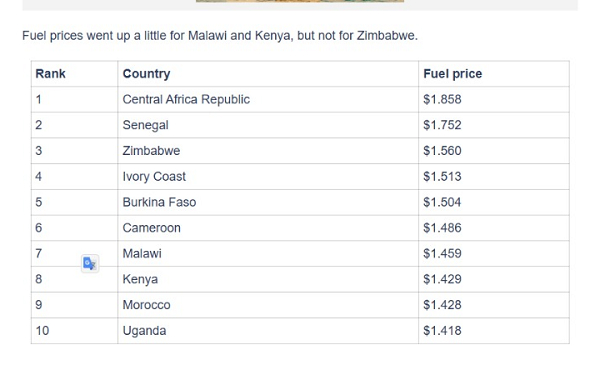Business News of Wednesday, 20 August 2025
Source: www.legit.ng
Nigeria missing as new report list countries with the highest fuel price in August
One of the most significant factors affecting daily life and economic reality in Africa is the price of gasoline. Increases in gas prices have an immediate and significant effect on businesses, governments, and consumers.
Transportation expenses are raised by high fuel prices, making it more costly to move people and goods.
Since the majority of agricultural products must be transported over long distances, households will have to pay more for their commuting and food.
Increasing fuel prices increase production costs for businesses, especially those involved in manufacturing, transportation, and farming, and often force them to pass the cost on to customers, creating an inflationary spiral.
The social consequences are as unsettling. High gas prices isolate residents in isolated areas without public transportation, making it challenging to get to schools, stores, and medical facilities.
The amount of money that city workers spend just to get to work is rising, which lowers their disposable income and makes poverty worse.
Macroeconomically speaking, high gas prices increase inflationary pressures, reduce purchasing power, and can lead to unrest. In recent years, protests have taken place in a number of African countries as citizens protest fuel price hikes, which are usually linked to reductions in subsidies or currency devaluation.
In the end, fuel is a lifeline; when its price increases too much, it exacerbates inequality, impedes economic progress, and threatens stability. This puts a great deal of strain on governments, who must balance maintaining low prices for gasoline with managing the financial burden of subsidies or expensive imports.
Finding strategies to keep gasoline cheap through refining capacity, alternative energy, and effective distribution is not just an economic but also a social necessity for Africa, where energy and transportation are essential to development.
According to Global Petrolprices, which shows that the average price of gasoline worldwide is $1.29 this month, these are the African nations with the highest fuel costs at the moment.
Fuel prices in the Central African Republic, Senegal, Ivory Coast, Burkina Faso, Cameroon, Uganda, and Morocco all decreased from the previous month.
Fuel prices went up a little for Malawi and Kenya, but not for Zimbabwe.

Filling stations announce latest petrol prices
Legit.ng reported that Marketers across the country have reduced their petrol prices following changes in ex-depot prices by Dangote refinery and private depot owners.
The latest survey showed that petrol at Nigerian National Petroleum Company Limited (NNPC) retail stations is selling for N865 per litre, down from the previous rate of N890 per litre.
N865 per litre is the same rate for petrol at the filling stations of Dangote refinery partners such as MRS, Hyde, and Ardova.












